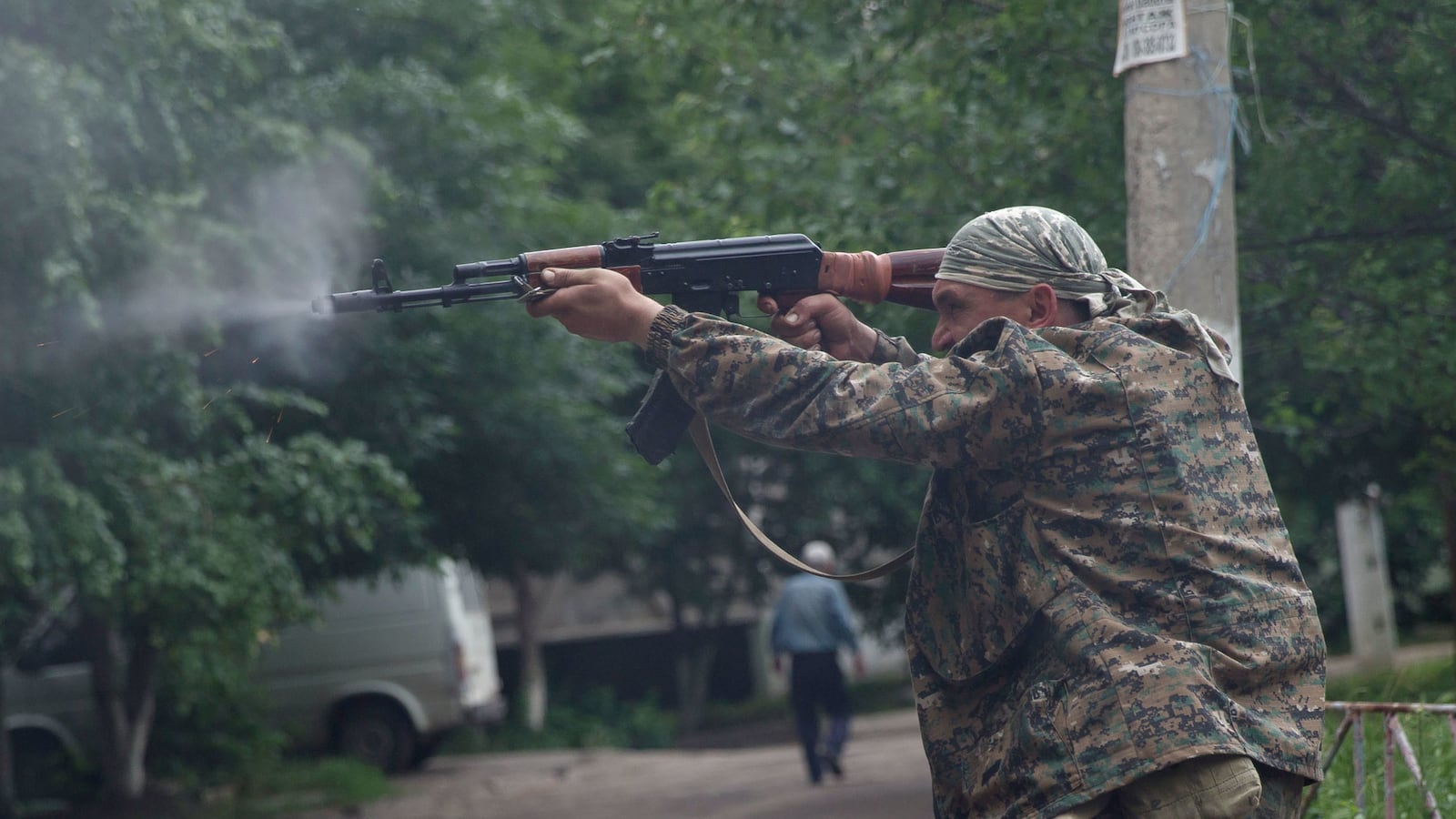KRASNY PARTIZANSK, Ukraine — This border crossing between Ukraine and Russia is now in the hands of rebels. Ukrainian border guards have abandoned their posts, and there is no barrier to stop the insurgents from funneling fighters and supplies into their breakaway republics.

What this means is that even as Russian President Vladimir Putin meets with senior European leaders on Thursday and he and U.S. President Barack Obama circle each other warily during the D-Day commemoration in Normandy on Friday, the war in eastern Ukraine may be moving into high gear.
Although Putin has withdrawn most of the Russian troops that had been poised on the frontier threatening a conventional invasion, the way is now open for volunteers and operatives of various stripes, along with supplies, to move freely into the country.
GALLERY: The War for Eastern Ukraine Intensifies (PHOTOS)

A couple of journalistic colleagues and I had been hearing about attempts to open this corridor for several days as we traveled in eastern Ukraine. The Russian ministry of foreign affairs, Russian parliament parliamentarians and the Russian volunteers in Ukraine we spoke to all talked about establishing what they called a “humanitarian corridor.”
We had been looking for the hole in the border, and we discovered it Wednesday near a city called Sverdlovsk in the region of Luhansk.
Two local taxi drivers, Aleksei and Vladislav, drove us to the crossing point, which is called Krasny Partizansk in Russian or Chervono Parizansk in Ukrainian. Shortly before we arrived, armed rebels took over the base and took down the Ukrainian flag.
There is now no flag at the border. It is now nobody’s border, the locals are joking. One of the rebels told us that no passports or identity papers had to be checked on this side of the frontier any longer. We saw cars crossing into Russia with only Russian customs checking their papers.
Aleksei called out to his friend: “Do you want to go to Russia? Go! There is no border left!” He gave a little laugh.
Meanwhile, all the Ukrainian border guards from the occupied crossing point loaded their children and wives into more than 20 vehicles and fled from Krasny Partizansk.
As I write, we are driving with this caravan of military and civilian vehicles full of Ukrainian soldiers and their families. They are terrified that rebels will shoot at them at any checkpoint or from the forest along the deserted roads of Luhansk region. They said they got an order from their commanders to leave, then another command to stay, but they decided to ignore the second order because they had children and women and everybody wanted to leave.
At nightfall we learn that the Ukrainian military has issued a statement saying that “in connection with sharp and sudden increase of danger” they had to conduct a special operation and move some of the Donetsk and Luhansk border troops outside their usual bases, but they insist that now border guards perform their duties from new locations.
The caravan is moving at about 40 kilometers an hour (25 mph) looking for a safe place to spend the night as it’s getting dark—a sad, scared convoy of fleeing border guards lost in an enemy-occupied land.
Earlier in the day, after a night of heavy fighting in Luhansk, the biggest city near the border, we had emerged from our lodgings to find the aftermath of the battle around a Ukraine National Guard base in the very center of town.

Two local families from a five-story apartment building right next to the base said they had spent “a nightmare night” sitting in their bathrooms. Two little boys were collecting shell fragments on the road outside the base, which was by then occupied by armed rebels of the self-proclaimed People’s Republic of Lunansk.
“The rebels must be insane, to begin a war in a courtyard full of apartments! We don’t want Luhansk to be controlled by gunmen, we demand Kiev to stop this horror,” a middle-aged woman named Ludmila Melnikova said with tears in her eyes. But Kiev seemed too far away and too weak to be able help Melnikova and her neighbors.
Ukrainian Interior Ministry spokesman Anton Sherbakov told me he was “aware Luhansk is falling, but there’s not much we can do—Luhansk is a big problem.”
After the main border guard base in one district of Luhansk surrendered at 6 a.m. Wednesday, none of the 11 checkpoints along the border had any clear understanding what to do next. “We cannot make our soldiers fight, when their families come to the gate of military bases and beg us to let their loved ones go,” Sherbakov said.
The local drivers Aleksei and Vladislav were happy to get rid of the Ukrainian, military they said. We had heard rumors that fierce Chechens might now come through the “humanitarian corridor.”
“Chechens? They are our guys, let them come!” said Vladislav. “Nothing will stop them at the border any longer.”
Shortly after dark, the fugitive border guards and their families reached the safety of a large Ukrainian base far from their abandoned posts.






